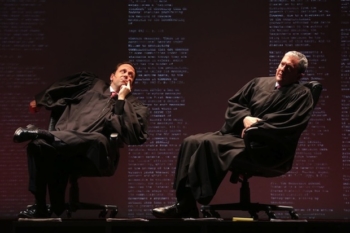
- Chicago Sun Times March 12, 2014
- Chicago Tribune March 16, 2014
- Slate October 23, 2013
- Metro US October 21, 2013
- The American Conservative October 18, 2013
- Wall Street Journal October 7, 2013
- Gothamist October 2, 2013
- New York Magazine September 26, 2013
- Broadway World September 24, 2013
- The New York Observer September 24, 2013
- The Village Voice September 25, 2013
- Entertainment Weekly September 24, 2013
- Theater Mania September 24, 2013
- Curtain Up September 25, 2013
- The New York Times September 24, 2013
- The Village Voice September 4, 2013
- The Paris Review May 31, 2012
Theater Review: “Arguendo” at Woolly Mammoth
The New York company Elevator Repair Service reenacts a 1991 Supreme Court case in an occasionally funny, ultimately superficial work of theater.
The theatrical potential of the Supreme Court is vast, with its costumes, high-stakes drama, and collection of eccentric characters (Arena Stage even offered an April Fools’ Day prank this week that announced a Supreme Court theater festival including Synetic Theater’s The Bench Is Silence: The Clarence Thomas Story). New York ensemble company Elevator Repair Service brings a different meaning to the term “the highest court in the land” with Arguendo, its anarchic, inventive, and surreal adaptation of a 1991 court case concerning the freedom of Indiana strippers to perform totally nude: Whatever these judges are smoking probably should be shared with the audience for maximum effect.
The gimmick of the show is that the majority of it is taken verbatim from the actual oral arguments of Barnes v. Glen Theatre, in which erotic dancers at the Kitty Kat Lounge and Glen Theatre protested an Indiana statute mandating adult performers to wear pasties and thongs. Three actors play all nine justices, ranging from Scalia to Souter to O’Connor to Rehnquist, in an artistic decision that manages to both confuse the audience and deprive the judges of any individual characteristics beyond habitual throat clearing or falling asleep.
The case itself is bookended by two original scenes, one in which a dancer (Maggie Hoffman) tells a group of reporters outside the court why she’s traveled all the way from Michigan to be there, and a rather tender final scene in which Justice Ruth Bader Ginsburg (Susie Sokol) describes why she chose to add the personal touch of a white lace collar to her official robes. Both are engaging, and make you wonder why Elevator artistic director John Collins chose to rely so heavily on court transcripts for the rest of the play.
Here’s the thing: Court cases are kind of boring, even when Justice Scalia is exclaiming wildly about G-strings and the art of stripping is compared to performing opera. Collins wisely keeps the length of Arguendo to a brief 70 minutes, but even when he has the characters on stage whiz around frantically in their office chairs to provide some movement, there’s barely enough action here for an SNL skit. Things take a surreal turn in the third part of the case, when reams of papers fly through the air and the video projections of court documents (by Ben Rubin) zoom in and out so frantically that they become migraine-inducing. Also, one of the lawyers (Mike Iveson) does something that’s ostensibly designed to narrow the gap between the court and the Kitty Kat Lounge, but which ends up feeling needlessly schlocky, to say the least.
Making a play out of a notorious case is a worthwhile activity, but in this case, what’s missing is a greater point being made. Sure, we can laugh at the justices as they grapple with phrases such as “discernibly turgid state,” but the 23-year-old nature of the arguments means they don’t have much, if any, insight to offer to a contemporary audience. Yes, Americans can be absurdly puritanical at times, and yes, it’s funny to watch stuffy elderly folks struggle to talk their way around gynecological attributes. In Latin, “arguendo” means “for the sake of argument.” As theater goes, this Arguendodoesn’t end up digging much deeper.
Read the original article here.